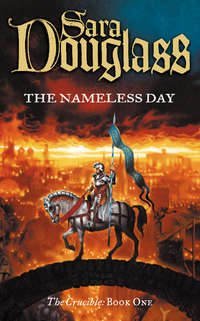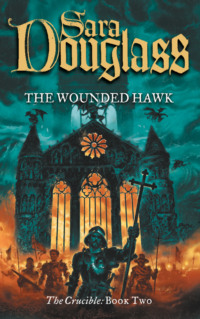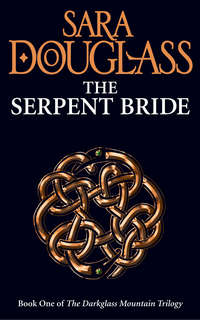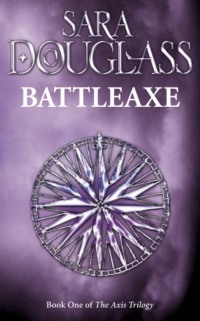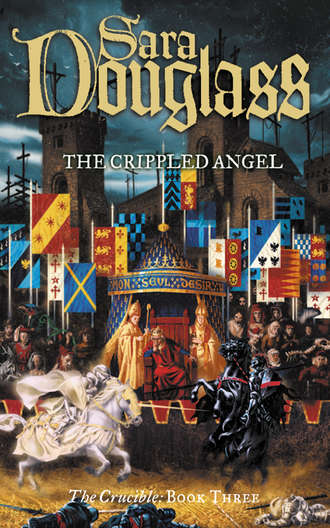
Полная версия
The Crippled Angel
Instead, her mouth curved in a small smile of joy. Had he known that she would be lying here in the pre-dawn dark, a prisoner of both her failing flesh and her terrified thoughts?
She heard him move to the side of her bed, smelt his manly fragrance, and finally she opened her eyes, and allowed her mouth to stretch into a full smile.
“Tom, what do you here in my chamber so early?”
There was a faint light from the windows now, enough to catch the flash of Neville’s smile within the blackness of his well-clipped beard.
“Come to rouse you for the tournament, lady. Myself and,” he glanced over his shoulder, “my lovely wife.”
Now Margaret’s form rose behind that of her husband, and Mary’s smile stretched even wider. She looked back to Neville, still grinning at her.
“You shall cause great gossip, my lord, coming so unannounced into my chamber.”
Margaret laughed, and walked around Neville to sit on the side of Mary’s bed, gently, so as not to jolt her. “He has me as a chaperone, madam. His jealous wife shall make sure he gets up to no mischief.”
Mary’s eyes filled with tears again, but tears of gratefulness rather than despondency or pain. Their jesting did for her what no amount of solicitous words and gestures could do—make her feel worthwhile, as both a woman and a friend.
“I come merely because my wife thought that she might need a loud voice with which to rouse you,” Neville said. He’d taken a step closer to the bed, and now stood behind Margaret, one hand resting on her shoulder. “I shall not stay, for I know these first hours of a queen’s day are dominated by her women, and do not allow the presence of a man. But,” he found his voice had lost its jesting tone, “how do you feel, my lady queen? Does the thought of a day at the tournament cheer you, or cause you distress?”
Mary smiled at Neville, and then at Margaret. “It cheers me,” she said, “for I think I shall enjoy watching full grown men beating each other about the ears with lances and clubs.”
Neville nodded. “Then I shall leave you to the attention of your ladies, madam,” he said, “and will instead go to ensure that your litter, comfortably cushioned and screened, is waiting for you after your breakfast.”
He bent, kissed Mary’s forehead familiarly, then kissed Margaret’s mouth, and with a bow and a flourish, left the chamber, flashing a grin at the two women standing by the hearth as they watched with curious eyes the group about their queen’s bed.
By mid-morning it had become apparent to all concerned that the great tournament at Windsor would be held under fine and warm skies. A great omen, whispered some among the ten thousand strong crowd that had gathered, for the bright dawning of the new reign. Many had made the journey from London to the tourneying fields a mile beyond Windsor over the previous days, others from the countryside nearer the castle that very morning. Some were there only to watch the jousting of the nobles, some to partake in the wrestling matches and other games scheduled to entertain the throng, others to set up stalls to cater to the thirst and hunger of the spectators and participants alike. Still others were there to feed off the crowd itself: cutpurses and thieves, and grim-faced friars determined to convince as many as possible that the Devil Himself lurked among the fun and frivolities scheduled for the day.
Trenches, recently erected wooden picket fences, and lines of determined pikemen kept the commoners at a respectful distance from the tents and horse lines of the nobles and knights—numbering some seven thousand if all their retainers were counted. The tents, with their gaily flapping pennants, flags and ribbons, stretched over almost fifteen acres of meadowland. Horse lines divided the grouped tents of households and loyalties—double lines of snorting, stamping, rolling-eyed destriers, kicking at their grooms as one means of tempering their impatience for the battles ahead.
Almost precisely between the tent city of the nobles and their retainers and the thronging horde of onlookers and merchants lay the tourneying field. It covered almost four acres: the green-grassed tourney field itself, flanked on two sides by the three-storey timber stands for the wives and families of nobles; and spaces for the common crowd at either end and in a narrow, fenced area directly before the stands. Pennants and ribbons fluttered here as they did among the tents, while jugglers, sword dancers and musicians with lutes, harps and bagpipes wandered up and down the jousting lanes of the tourney field, entertaining the gathering crowds until the fun and bloodshed should get under way in earnest.
By midday the spectators had gathered tight about the timber stands which were packed with the families of the combatants. Jingling and clanking from the tents and horse lines suggested that both men and beasts were readying themselves for the fray, and a murmuring rose from the crowds.
Just as the restlessness edged towards the potentially uncontrollable, a shout went up, and the crowds roared as one (even if most had no idea what was going on). Two columns of richly attired and liveried horsemen rode onto the field, an escort for a horse litter of unparalleled magnificence.
“The queen!” the shout went up. “The queen! Hurrah for Mary, sweet Mary!”
Neville, riding his skittering stallion close to Mary’s litter, leaned down and grabbed a handful of the rich silky stuff that made up the hangings.
“With your permission, madam,” he said.
“Of course, my lord,” Mary’s voice said. “I would show them my gratefulness.”
Neville grasped the hanging more tightly, then lifted it and threw the material across the top of the litter, nodding to his squire, Robert Courtenay, who rode as escort on the other side, to do the same. Within moments both men had exposed Mary and her waiting women inside the litter to the full view of the crowds, and the roar rose to a thunder as Mary leaned forward and waved to the gathered people, smiling sweetly. She looked thin and pale, but her thinness and pallor was counterbalanced by her patent merriness and joy at the reception of the commons.
The thunder, if possible, grew louder, and people waved hats and scarves above their heads, acknowledging their queen.
But within the litter, Margaret saw how Mary’s hand trembled, and how her lips pressed too tightly together.
“Madam,” she murmured, leaning close, “do not tire yourself.”
Mary continued waving. “I cannot disappoint them,” she said. “A little ache here and there is a small enough price.”
Margaret’s eyes narrowed. Mary was suffering more than a ‘little ache here and there’. When Margaret had aided Mary in her morning ablutions, and helped her to dress, she’d noted with concern how the queen had winced and, on several occasions, bit her lip to keep from crying out. And when she’d brought Mary her bowl of bread sops, Mary had hardly been able to swallow more than five mouthfuls.
If nothing else, Mary was likely to faint from hunger, if not her pain, within ten minutes.
Carefully, and as surreptitiously as she could, Margaret moved close enough to Mary to pack in some more supporting cushions about her back and hips.
“I do thank you,” Mary whispered as she continued to smile and wave, and the sheer gratefulness in her tone brought tears to Margaret’s eyes.
“When we are settled in the stand,” Margaret said quietly, “I shall give you a few drops of Doctor Culpeper’s liquor which I have in my waist pouch. It will deaden some of the pain.”
Margaret saw that Mary was about to object, and hastened on: “You shall be of no use to anyone if you cry out and faint from pain and weakness, my lady. A few drops will ease the pain, but allow you to remain alert.”
To Margaret’s relief, Mary nodded slightly, and Margaret looked to see Thomas watching, and she inclined her head and watched the relief spread over his face as well.
The acclaim of the crowds only grew louder when the litter drew to a halt before the grandstand at the head of the field. Thomas Neville jumped down from his horse, and bowed before Mary in the litter. She nodded, and he leaned forward and gathered her into his arms, gently adjusting her weight so that he did not jolt her.
“There are ten thousand men here today who would give their lives for you,” he whispered.
“I do not deserve their—”
“You deserve the reverence of the sun and that of the moon as well, my lady,” he said. “That of ten thousand men is the very least of what you are owed.”
And with that he strode to the stand, climbing the stairs to the royal box and resting his queen gently onto the pile of cushions waiting there for her.
Margaret and the three other accompanying ladies moved to their places behind and about Mary as Neville bowed deeply one more time and took his leave with a smile.
At the bottom of the stand he spoke softly and urgently to Courtenay, his eyes jerking over the crowd as he spoke. “Robert, I do not like the feel of this day. Bolingbroke was a damned fool to organise this tournament in the first instance, let alone when rumours of Richard are feeding more fires than all the chopped wood in England.”
Courtenay nodded, his own gaze wandering over the crowd. The majority of kings in the past hundred years had banned tournaments, not only because the violence of the tourney field tended to get out of control and spill into the crowds, but because very few kings liked being surrounded with the private armies of the nobles.
Times like these, ambitious nobles tended to get ideas.
“At the least,” Courtenay replied, “Hotspur is not here.”
Neville grunted. Hotspur, once the close friend of both Neville and Bolingbroke, was still lurking in the north, “attending”, as he communicated to Bolingbroke in the occasional letter, to the Scots.
He had yet to offer his allegiance to Bolingbroke, and Neville did not think he ever would; not with Hotspur’s ambitions, and not with the army he could raise in the north whenever he needed. If Bolingbroke ever wanted to leave England to fight for France, he was going to have to “attend” to Hotspur first.
“If Hotspur and his army had been here, Bolingbroke would most certainly never have consented to the tournament,” Neville said, then managed a tight grin. “Damn Hotspur. Why is he never here when we need him?”
A movement to the side caught both men’s eyes. Men with horns had moved into ranks either side of the field.
“Bolingbroke is about to arrive,” Neville said. “Robert, I would be better to spend my time moving among the combatants than here. At least for the time being. Will you—”
“No need to voice the command, my lord. I will guard Mary, the lady Margaret and the other ladies with my life.”
“Good. I will send a company of men to assist you. Robert—”
“With my life, my lord!”
Neville nodded, clapped a hand briefly on Courtenay’s shoulder, then melted into the crowds behind them.
Bolingbroke arrived in much greater splendour than his wife, but to no less acclaim. He cantered onto the field atop a great, white dancing stallion caparisoned in crimson and emerald green silks and tassels. Atop Bolingbroke’s brow rested a glinting golden crown, resplendent with gems, and about his shoulders hung a purple velvet cloak, trimmed with ermine. His tunic and leggings were all of cloth of gold, richly embroidered and thickly crusted with pearls and silver threads. His face was confident and joyous, and he stood in the stirrups, waving to the crowd, and shouting to them his well-wishes and his love for them.
It was fine theatre.
At the head of the field Bolingbroke reined in his stallion, sinking back into the saddle. He raised his glorious face, staring directly at Mary. As she nodded, he smiled, and bowed in the saddle to her, making humble obeisance to his wife.
The crowd adored it.
“He should have been an actor on the stage,” Mary whispered to Margaret.
“He would not dare not to love you,” Margaret replied. “Not here. Not now.”
Mary gave a very small nod, then smiled the greater at her husband, now rising from his bow, and waved at him with her hand to join her in the royal box.
“We are all actors in this great drama,” she said, and then she turned her head to Margaret and looked her full in the eye. “But sometimes I think there is more to this plot than my ladies will tell me.”
Before a startled Margaret could think of a response, Mary had turned back to Bolingbroke, now dismounting from his stallion, composing her face into a smile of proper wifely love and respect.
“Best give me your vial of Culpeper’s liquor now, Margaret,” Mary murmured, “so that I may the better play my part.”
IV Saturday 4th May 1381 —ii—
The tournament began immediately Bolingbroke had taken his place beside Mary and nodded his readiness to the officials.
Within ten minutes the grinding, bloody, sweaty, bone-breaking, heart-stopping action had begun. Having agreed to the tournament itself, Bolingbroke had nevertheless drawn the line at allowing the traditional melee of several hundred knights drawn up into two opposing forces that charged down the field to engage in several hours of hacking, clouting and cursing until only a few men (and horses) were left standing. Instead, the action began with something only a little less spectacular.
The tourney field had been divided into twenty-five jousting lanes, and at the drop of the official’s flag, fifty knights lowered their lances and kicked their stallions into action. The thunder of the great horses’ hooves as they crashed down the lanes was outdone only by the screams of the crowd and the eventual grinding and screeching as lances struck or glanced off the breastplates and shields of opponents. Some knights managed to hold their seats, others were unhorsed on their first pass and left to flounder on the turf hoping the momentum of their fall and the weight of their armour wouldn’t roll them into the path of an oncoming destrier.
Destriers were bred for their density and thickness of muscle, their strength and their weight: they were not renowned for their ability to jump anything larger than a mouse or dodge anything in less than a gentle quarter-mile curve.
One man died and two were crippled when the huge, sharpened hooves of galloping destriers cut right through their armour and the bones and flesh beneath.
The horses trampled on, almost unaware of the men they had cut to ribbons beneath their hooves.
The unhorsed knights who managed to roll to their feet rather than under the oncoming death of destriers, steadied themselves and drew their swords. Those knights who made it to the other end of the jousting lanes still on their horses now dismounted and drew their own swords, striding as best they could in their enveloping armour back down the jousting lanes to meet their opponents in true chivalric fashion, one on one, sword to sword. Blades clattered against heads and necks, trying to find that sweet opening between helmet and shoulder and breast armour.
Opponents rested after each swing, gathering their strength to once again raise the massive blades with arms made heavy by their encasing armour and strike again.
Blood seeped out from joints in armour, and trailed in apologetic rivulets down breast and thigh plates. Breathing became harsh, and was intermixed with curses and shouted entreaties for aid to sundry saints. Some men pissed or shat themselves, either with fear or exertion, and the stink of urine and faeces added itself to the other manly odours of battle.
The crowd went wild. Men surged against barriers, each individual shouting encouragement to the knights of his choice, and curses against their opponents. Some spectators threw rocks and other missiles into the arena. Some turned against their neighbours and sent fists crashing into cheekbones and chins in the excitement of the moment.
The behaviour of the noble families and wives in the stands was scarcely better. Women leaped to their feet, waving streamers of their household colours, urging their menfolk on to greater efforts with voices shrill with battle lust. Young pages and valets, beside themselves with sorrow that they should not be on the field themselves, punched fists into the air, and shouted wagers into the din, sure that their lord would be the one to prevail.
And amid all this, the valets and pages of the fallen darted among the warriors on the field, litters dragging and bumping behind them, searching out their masters that they might attempt to roll them onto the litters and get them to the dubious safety of the surgeons’ tents.
Bolingbroke leaned forward eagerly, one fist clenched, his eyes straining to take in all the action.
“Surely this death and maiming is not so exciting?” Mary murmured, sickened at the sight before her.
“I need to know on whom I can rely on the battlefield,” Bolingbroke replied, not lifting his eyes from the action. Then he relaxed a little, and leaned back. “There? See? It is all but done. Some knights have conceded, while others have won outright.”
He stood and clapped his approval of the actions of the men below, and the crowds roared with him. The fighting was done now, and some knights strutted off the field, having triumphed against their opponents; later they would receive tokens from the king to mark their victory. Others slumped wearily, shamed. And others twisted, moaning, or, worse, lay still on the grass waiting for the final scurrying pages to come by with their litters.
And when all was finally cleared, men darted out with baskets of sawdust to dry out the patches of clotting red so that the next two lines of jousters would not slip and fall on the blood of their predecessors.
The day proceeded.
Neville wandered through the barely-controlled chaos amid the tents and horse lines of the nobles. Several rounds of jousting had now taken place, and soon the tournament would move into its most exciting stage: the great nobles, men who had fought and lived through a score of battles, would joust one on one.
No doubt there shall be a few scores settled this day, thought Neville as he pushed his way through the crowds, seeking his uncle Ralph Neville’s tent. Ah, there, the standard of Westmorland. He nodded to the guards outside the tent’s entrance, then ducked inside.
His uncle was standing in the centre of the space, almost fully armoured, his face a mask of impatience as two of his squires tugged at buckle straps, and twisted plates into place. The earl grimaced at Neville’s entrance, and Neville was not sure if that was because one of the squires had tugged too tightly, or because his uncle was not happy to see him.
“You’re not going to fight?” Raby asked. “You have decided to play the part of the spectator?”
Ah, no wonder his uncle had grimaced at him. Raby had never been the one to pass a fight without adding his sword to it.
“There will be battle enough in the coming months,” Neville said. “Today I will wander the encampment, the better to understand the strength of various houses.”
“Humph,” Raby grunted. “First a warrior, then a priest, now a courtier. Will there never be an end to your incarnations, Tom?”
“I am just Tom,” Neville said, “choosing to reveal myself in different ways.” He walked closer to his uncle, and the squires, their task done, melted away. “Will you have some wine before you enter the lists, uncle?”
“Aye. It will steady my hand.”
Neville walked to a small table, poured out two goblets of wine from a ewer, and handed one of them to his uncle. “And who is your opponent?”
Raby hesitated. Then… “Exeter.”
Neville halted with his goblet halfway to his mouth, stunned. “Exeter? John Holland?” Richard’s half-brother against his uncle, the man responsible for garnering support for Bolingbroke, who then supplanted and then murdered Exeter’s brother?
“The very same.”
“And who arranged this?”
“Exeter himself, I believe,” Raby said, and drained his goblet. “I heard he specifically asked to be set against me.”
Neville took the empty goblet from his uncle’s hand and set it, together with his untouched one, to one side.
“Uncle… be careful. Exeter is dangerous.”
“And I’m not?”
“I didn’t mean dangerous as in skilled with a weapon, uncle. I meant dangerous in the use of treachery. Do you think he will allow his brother’s death to go unchallenged? Unrevenged?”
“If he knows what is best for him… yes.”
Neville turned away, fingering Raby’s mail gloves which lay on the table. “The Hollands are a powerful family,” he said.
Raby walked up beside Neville and took the mail gloves, pulling them on. “They wouldn’t dare. They are not that powerful. No doubt Exeter grumbles in private, as do most of the Holland family. But to take on Hal? No. They wouldn’t dare. Tom, they wouldn’t.”
That’s what Richard and de Vere believed about Bolingbroke, Neville thought, and that mistake killed them.
He forced a smile to his face. “Then I wish you good luck in your joust, uncle. I hope your lance bounces off his balls and bruises them so badly he shall not sire any more sons.”
Raby guffawed loudly. “I shall aim with intent,” he said. “England could do with a few less Hollands. Now, where are those damn squires? I need my helmet!”
When he’d left his uncle, Neville wandered as close as he could to Exeter’s tents without attracting unwanted attention. Sundry knights and nobles scurried about, most in full battle armour, all with tense expressions and narrowed eyes that darted this way and that.
Neville stood behind the tent of a minor noble and chewed at his lip in thought. How many men did Exeter and his fellow Hollands have with them? Two or three hundred, no more. They wouldn’t have been able to bring any more without attracting undue attention.
So, Exeter’s allies, then. Who were they likely to be? Northumberland? Northumberland had ever had his disagreements with Bolingbroke and his father, the Duke of Lancaster, and particularly with Neville’s own family. But Northumberland had too much to lose by turning against Bolingbroke, and far more to gain by standing at his side.
So Northumberland was unlikely to ally himself with Exeter, and Hotspur, Northumberland’s son, who may very well have supported an Exeter bid to topple Bolingbroke, was still far in the north.
There were, of course, a slew of lesser nobles who might support Exeter—Neville well knew that the wounds caused by Bolingbroke’s extraordinary rise to power had not yet healed—but Neville simply couldn’t see how they could hope to form a force strong enough to defeat Bolingbroke’s allies who were here in force; Raby and Northumberland, in particular, had huge escorts of men at the tournament.
A movement to his left caught Neville’s eye and he turned, then frowned slightly at what he saw.
None other than the Abbot of Westminster, striding out of Exeter’s tent and looking guilty enough to confess to Christ’s murder if someone should put a knife to his throat and ask him to say the words.
The abbot disappeared down a narrow alley between rows of tents, and Neville hurried after him.
After five minutes the abbot paused, looked about—causing Neville to duck behind a saddled destrier—then entered a small tent. In an instant he was out again, and a few heartbeats after his exit five Dominican friars hurried out, split up, and merged into the crowds.
What was the abbot doing, consorting first with Exeter, then with Dominicans, of all people?
Neville hesitated, then followed one of the Dominicans. The man’s hooded black figure made him easy to track at a safe distance in the otherwise gaudy multitude.
The friar led Neville back towards the hordes of common folk who had come to watch the tournament. Now and then he would stop, catch the attention of a small group of men and women, whisper something, then move on.


